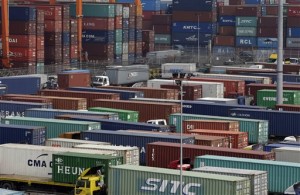MANILA, Philippines—Doing business in the Philippines became more difficult in 2014, partly as a result of Manila’s truck ban, which constricted the country’s main gateway for international trade.
However, as a result of a methodology change, the country’s rank in the world improved to its highest ever, reflecting gains from last year that were recognized only in the latest report.
The World Bank’s latest “Ease of Doing Business” report showed a nine-point drop in the Philippines’ rank in a list of 189 countries. Using a new methodology introduced this year, the Philippines is now 95th in the world from a revised rank of 86th last year.
“Trading across borders became more difficult because of a new city ordinance restricting truck traffic in Manila,” the World Bank report read.
Among Southeast Asian nations, the Philippines placed 5th, trailing Singapore, which topped the global list again, Malaysia (18th), Thailand (26th), and Vietnam (78th). The Philippines was also within striking distance of China, which placed 90th.
The World Bank’s “Ease of Doing Business” survey is one of the main indicators used by the Aquino administration to show improvements in the way the country is being run.
Other international benchmarks include the World Economic Forum’s Global Competitiveness Report and Transparency International’s Corruption Perception Index. Significant improvements by the Philippines since 2010 have been noted in all three surveys.
Joining Singapore in the top five of this year’s edition were New Zealand, Hong Kong, Denmark and South Korea.
Last year, using the old methodology, the Philippines was the most-improved country, moving up 30 points to place 108th in the world.
In the new report, the Philippines’ score fell in eight of 10 criteria led by “Trading Across Borders,” “Protecting Minority Investors” and “Paying Taxes.” The Philippines’ scores were unchanged in the “Getting Electricity” and “Enforcing Contracts” criteria.
The World Bank survey looks into various indicators, including the number of days and steps needed to get new business permits, and the ease at which a business can be closed down, among others.
With this year’s showing, the Philippines moves closer to hitting its goal of getting into the top 33 percent of countries from being in the bottom third in 2010. Since 2011, the Philippines has risen a total of 53 spots.
“We’re on track and we’re moving in that direction,” said Guillermo Luz, the private sector co-chair of the National Competitiveness Council (NCC), whose job is to work on improving the country’s rank in international surveys.
Even as he welcomed the report’s results that showed the Philippines ranked ahead of more countries, Luz complained that changes in the World Bank’s methodology were not communicated “in a timely manner.”
“It’s like there were two extra items in a test you had to take. You’re given a 10-point checklist to prepare for, but you didn’t know what those two items were. You didn’t even know those were going to be asked,” he said.
“We would have nailed those,” Luz said.


